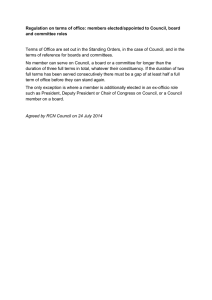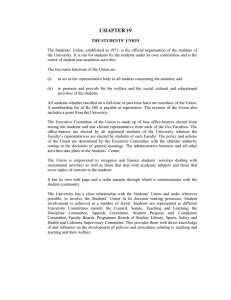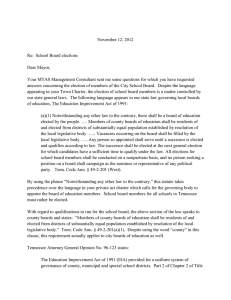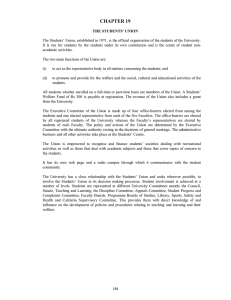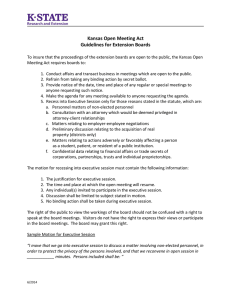March 5, 2008 Dear City Attorney,
advertisement
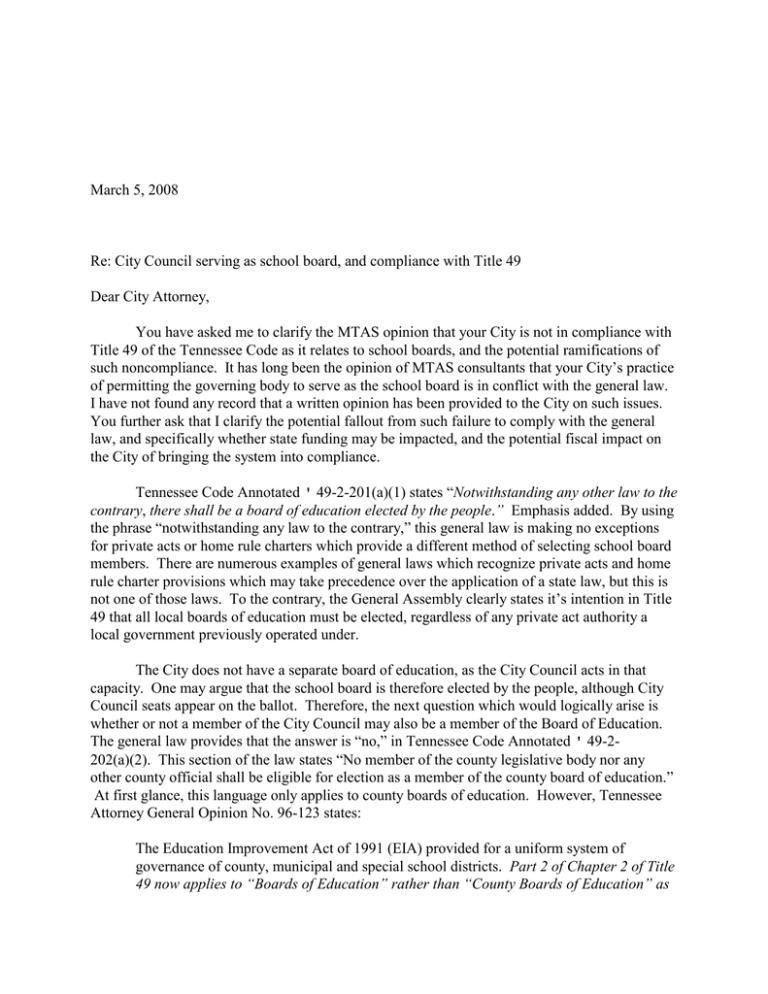
March 5, 2008 Re: City Council serving as school board, and compliance with Title 49 Dear City Attorney, You have asked me to clarify the MTAS opinion that your City is not in compliance with Title 49 of the Tennessee Code as it relates to school boards, and the potential ramifications of such noncompliance. It has long been the opinion of MTAS consultants that your City’s practice of permitting the governing body to serve as the school board is in conflict with the general law. I have not found any record that a written opinion has been provided to the City on such issues. You further ask that I clarify the potential fallout from such failure to comply with the general law, and specifically whether state funding may be impacted, and the potential fiscal impact on the City of bringing the system into compliance. Tennessee Code Annotated ' 49-2-201(a)(1) states “Notwithstanding any other law to the contrary, there shall be a board of education elected by the people.” Emphasis added. By using the phrase “notwithstanding any law to the contrary,” this general law is making no exceptions for private acts or home rule charters which provide a different method of selecting school board members. There are numerous examples of general laws which recognize private acts and home rule charter provisions which may take precedence over the application of a state law, but this is not one of those laws. To the contrary, the General Assembly clearly states it’s intention in Title 49 that all local boards of education must be elected, regardless of any private act authority a local government previously operated under. The City does not have a separate board of education, as the City Council acts in that capacity. One may argue that the school board is therefore elected by the people, although City Council seats appear on the ballot. Therefore, the next question which would logically arise is whether or not a member of the City Council may also be a member of the Board of Education. The general law provides that the answer is “no,” in Tennessee Code Annotated ' 49-2202(a)(2). This section of the law states “No member of the county legislative body nor any other county official shall be eligible for election as a member of the county board of education.” At first glance, this language only applies to county boards of education. However, Tennessee Attorney General Opinion No. 96-123 states: The Education Improvement Act of 1991 (EIA) provided for a uniform system of governance of county, municipal and special school districts. Part 2 of Chapter 2 of Title 49 now applies to “Boards of Education” rather than “County Boards of Education” as before.... Emphasis added. The Attorney General is therefore of the opinion that the law applies equally to municipal and county boards of education, despite the failure of the General Assembly to substitute more inclusive language in T.C.A. ' 49-2-202. There are numerous Attorney General Opinions applying the Education Improvement Act to city school boards. See for example, Tenn. Atty. Gen. Op. Nos. 93-15, 94-074, and 98-235. There are no reported court opinions or legislative acts which challenge this interpretation and application of the law by the Attorney General, so it stands as precedence on the issue. It therefore appears clear that the Education Improvement Act of 1991 (EIA), codified at Title 49 of the Tennessee Code, applies to the City. That being the case, the conclusion which logically follows is that the City must have an elected school board, and that the City Council may not legally serve as the school board, under the provisions of this law. Nor may a member of the City Council be elected to a school board seat. It is my understanding that the City Council has attempted to comply with a portion of the EIA by “electing” the Mayor as chair annually. T.C.A. ' 49-2-202(c)(2) requires that boards of education “Elect one (1) of its members as chair annually.” This issue has arisen due to the desire of some members to amend the Charter to provide for an elected Mayor. Currently, the Mayor is elected by the City Council from among the members of the governing body, and the public does not vote to fill the Mayor’s seat. If the office of Mayor becomes an elected office filled by the voters, how would that impact the practice of the Council of electing the Mayor annually as the chair of the “school board?” As we discussed in phone conversations, it is my opinion that the City cannot choose which sections of the general law apply, and ignore other requirements of the law. It is possible that amending the charter to provide for an elected Mayor may bring attention to this conflict with the general law, but it may not, in which case the Council may continue to pass resolutions yearly naming whoever is elected Mayor as the “chair” of the school board. The problem may occur if the vote to name the Mayor as “Chair” fails, or if another member of the body is elected. At that point, the public or other interested parties may start to examine the City’s failure to comply with the EIA, and potential challenges to the City’s practices may arise. What is the potential fallout? The answer is unclear. Tennessee Code Annotated ' 49-2403 provides “All such municipalities, establishing common schools under this part shall be entitled to receive their proportions of the general school fund of the state, to be applied with the fund collected under '' 49-2-401 B 49-2-403.” Funding from the state is therefore tied to a municipality’s compliance with the EIA. A legal challenge may therefore be launched challenging the ability of the school system to receive such funding, in light of the City’s failure to comply with the Act. As a practical matter, however, it would be highly unpopular for the state to withhold funds for children’s education. It is much more likely that a court would order the City to come into compliance with the EIA, and set a timetable for such actions to be completed. In such a lawsuit, which would likely be in the form of a mandamus action in chancery court, the “damages” which the City could potentially face would be in the form of attorney’s fees and costs of the suit. In addition, the City would eventually bear the costs of separate elections for the school board, and the costs required to maintain such a new body, including training, staff personnel and benefits for board members and personnel. The decision the City Council is faced with is whether to take action to come into compliance with the Education Improvement Act of 1991, or wait for a legal challenge which may force such actions. It is possible that certain changes to the City Charter may bring such issues to light, but no one can predict if a lawsuit will be filed or not. Those familiar with local politics and factions are in a better position to weigh the possibility of litigation. With regard to what other Tennessee cities have done, or are doing with their school boards, I have learned that there are several that do not comply fully with Title 49 and rely on private act provisions of their charters. Some differ with regard to the size of the school board, and some do have some appointed members of the board, in addition to elected members. But there is no other city in Tennessee to my knowledge in which the governing body acts as the school board. In that practice, your City is alone. I cannot estimate the costs which may be incurred by the City for holding separate elections for school board members, and the costs which are associated with forming and staffing such bodies. It is reasonable to assume that the cost will be at least equal to, and likely more, than the costs incurred for the election and functions of the City Council. In addition, the school board would have to obtain separate legal counsel, as their interests would result in a conflict for the City Attorney. It would clearly be a very expensive undertaking to make the changes necessary to bring your City into compliance with the general law. Whether or not such changes should be enacted voluntarily, or under a potential court order, is a decision to be weighed carefully by the City Council. I hope this information is helpful. Please let me know if you need further information or assistance in this matter. Thank you for consulting with MTAS. Sincerely, Melissa A. Ashburn Legal Consultant
